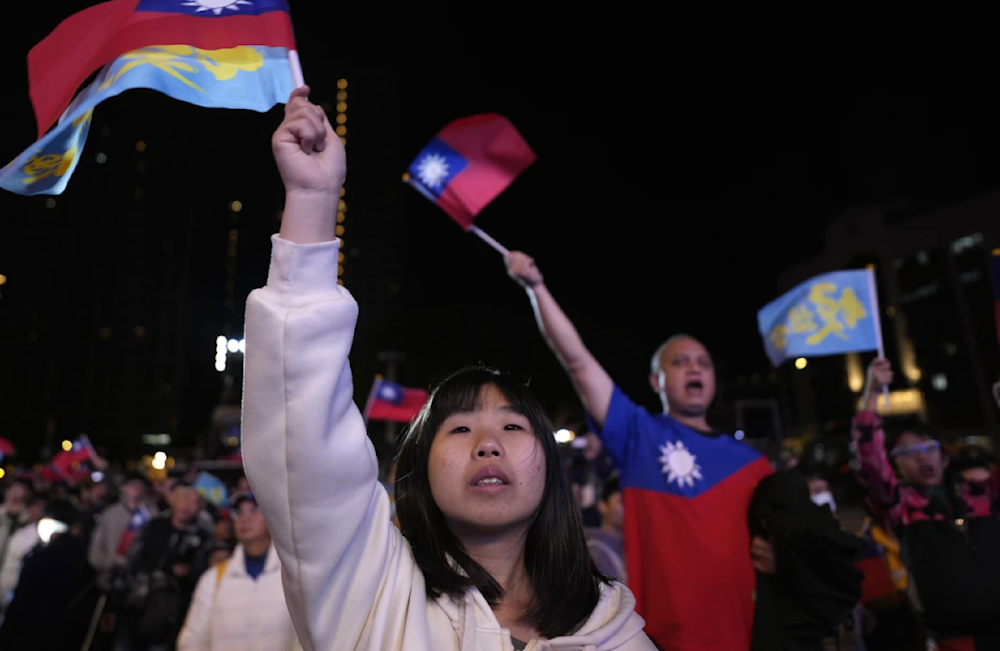Taiwan ruling party loses 11 seats; China affirms reunification stance
The DPP earned 51 seats, the Kuomintang, which promotes dialogue with Beijing, gained 52 seats, and the Taiwan People's Party secured eight seats.
-

Kuomintang (KMT) supporters react after their presidential candidate Hou Yu-ih admitted to defeat in New Taipei city, Taiwan, on January 13, 2024. (AP)
The ruling Democratic Progressive Party (DPP) has lost 11 seats in the Legislative Yuan, the island's parliament, as a result of the elections, the Taiwanese Central News Agency reported.
Earlier on Saturday, millions of Taiwanese headed to the polls for a presidential election, with China eyeing the results that could determine the new nature of relations between the two sides.
Lai, whom China describes as a "threat to peace," won an unprecedented third consecutive term for Taiwan's ruling Democratic Progressive Party (DPP).
For the legislature, the DPP earned 51 seats, the Kuomintang, which promotes dialogue with Beijing, gained 52 seats, and the Taiwan People's Party secured eight seats. The DPP was once represented in Taiwan's legislative assembly by 62 legislators, thus losing 11 seats in the current elections.
Furthermore, the agency reported that for the first time since 2004, no party gained a legislative majority of at least 57 seats.
China criticized the results of the elections, calling it a choice between "peace and war, prosperity or decline," confirming that the ruling Democratic Progressive Party does not reflect mainstream popular sentiment after failing to secure a majority in the presidential and parliamentary elections.
According to a CNBC report from Xinhua, Chen Binhua, the spokesperson for the Taiwan Affairs Office of the State Council, expressed on Saturday that "Taiwan is China's Taiwan," emphasizing that the election does not change "the basic pattern and the development of cross-Strait relations" or change "the basic landscape and development trend of cross-Strait relations".
Beijing's stance on "realising national reunification remains consistent, and our determination is as firm as rock," Chen said, stressing that the vote "will not impede the inevitable trend of China's reunification."
US hails results, says does not support Taiwan 'independence'
US President Joe Biden, commenting on Taiwan’s elections on Saturday, said the United States does not support the "independence" of the island.
"We do not support independence [of Taiwan]," Biden told reporters before leaving for the Camp David residence.
US Secretary of State Antony Blinken said in a statement that Washington looks forward to working with the new leadership of Taiwan in line with the one-China approach.
"We look forward to working with Dr. Lai and Taiwan’s leaders of all parties to advance our shared interests and values, and to further our longstanding unofficial relationship, consistent with the U.S. one China policy as guided by the Taiwan Relations Act, the three Joint Communiques, and the Six Assurances," the statement read.
He also reiterated that the US is committed to maintaining peace and stability across the Taiwan Strait and stands for peaceful resolution of differences.
Taiwan's opposition party candidate Hou Yu-ih admits defeat
Hou Yu-ih, the candidate for Taiwan's main opposition Kuomintang party, admitted his defeat on Saturday in the election of the island's head of state and asked his voters for forgiveness.
"I have disappointed everyone. I am here to express my deepest regret. Please, forgive me," Hou said in his address to the voters.
Beijing slammed frontrunner Lai Ching-te of the Democratic Progressive Party (DPP), the current vice president, as a dangerous "separatist" in the days leading up to the poll, calling on voters to make "the correct choice" if they want to avoid military conflict.
China claims Taiwan as its own and says it will not rule out using force to bring about "reunification". Chinese President Xi Jinping in a recent New Year's address said the "reunification" of Taiwan with China was "inevitable".
Earlier on Thursday, China warned against US intervention in Taiwanese-Chinese affairs, emphasizing the necessity to avoid any false signals that give separatists the wrong impression.
During a regular press conference on Wednesday, Mao Ning, China's Foreign Ministry spokesperson, said the US “needs to earnestly abide by the one-China principle and stipulations of the three China-US joint communiqués, prudently and properly handle Taiwan-related issues, and stop official contact with the Taiwan region.”
She then reiterated China's cemented stance against US intervention in Taiwanese elections, saying it sends separatists and independent forces the wrong message, as “there is only one China in the world. Taiwan is an inalienable part of China," adding that China firmly "opposes the US having any form of official contact with the Taiwan region."

 4 Min Read
4 Min Read








